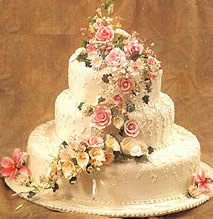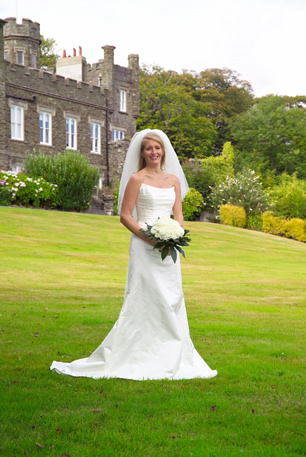What is a Wedding?
 A wedding is a ceremony that celebrates the beginning of a marriage or civil union. Wedding traditions and customs vary greatly between cultures, ethnic groups, religions, countries, and social classes. In some countries, cultures and religions, the actual act of marriage begins during the wedding ceremony. In others, the legal act of marriage occurs at the time of signing a marriage license or other legal document, and the wedding is then an opportunity to perform a traditional ceremony and celebrate with friends and family. A woman being married is called a bride, a man called a bridegroom, after the ceremony they become a wife and a husband, respectively.
A wedding is a ceremony that celebrates the beginning of a marriage or civil union. Wedding traditions and customs vary greatly between cultures, ethnic groups, religions, countries, and social classes. In some countries, cultures and religions, the actual act of marriage begins during the wedding ceremony. In others, the legal act of marriage occurs at the time of signing a marriage license or other legal document, and the wedding is then an opportunity to perform a traditional ceremony and celebrate with friends and family. A woman being married is called a bride, a man called a bridegroom, after the ceremony they become a wife and a husband, respectively.
A double wedding is a single ceremony where two affianced couples rendezvous for two separate weddings. Typically, a fiancé with a sibling might plan a double wedding with that sibling.
A destination wedding is any wedding in which the engaged couple and/or a majority of their guests travel to attend the ceremony. Whether this happens for an intimate beach ceremony in the Caribbean, extravagant nuptials in Las Vegas or for a simple ceremony in someone’s back yard, chances are it qualifies as a destination wedding.
A weekend wedding is a wedding in which couples and their guests celebrate over the course of a weekend. Special activities, such as spa treatments and golf tournaments, are scheduled into the wedding itinerary for guests’ enjoyment throughout the weekend. Lodging usually is at the same facility as the wedding and couples often host a Sunday brunch for the weekend’s finale.
 A white wedding is a formal or semi-formal wedding in the United Kingdom, Ireland and United States, as well as Commonwealth, traditions.
A white wedding is a formal or semi-formal wedding in the United Kingdom, Ireland and United States, as well as Commonwealth, traditions.
A military wedding is a ceremony conducted in a military chapel and may involve a Saber Arch.
An online wedding is a wedding that is either conducted on the internet, or is an event that resembles a standard wedding when two people who wish their avatars, or characters, to be married. Many couples are using the internet to meet and share their vows. Planning is made easy, with online wedding guides (see references) where reliable and friendly vendors are listed. Weddings that are broadcast live online are also referred to as online weddings.
A civil wedding is a ceremony presided over by a local civil authority, such as an elected or appointed judge, justice of the peace or the mayor of a locality. Civil wedding ceremonies may use references to God, but generally no references to a particular religion or denomination. They can be either elaborate or simple. Many civil wedding ceremonies take place in local town or city halls or courthouses in judge’s chambers.
 A church wedding is a ceremony presided over by a Christian priest. Ceremonies are based on reference to God, are frequently embodied into other church ceremonies like Holy Mass.
A church wedding is a ceremony presided over by a Christian priest. Ceremonies are based on reference to God, are frequently embodied into other church ceremonies like Holy Mass.
A Jewish wedding is a ceremony presided over by a rabbi. The rabbi recites the wedding blessing, reads out the ketubah, the rabbi, or those close to the couple, bless the couple by saying the seven blessings and the ceremony finishes when the groom breaks a glass underfoot.
Wedding ceremonies may contain any number of different elements, however most contain wedding vows of some kind and a proclamation of marriage, usually by the officiant. Most weddings also involve wearing the traditional clothes of the culture in which the couple is wedding. A wedding is often followed or accompanied by a wedding reception.
Other elements may include music, poetry, prayer, scripture, or other traditions. In most societies a number of traditions or customs have emerged around the wedding ceremony, many of which have lost their original symbolic meaning in the modern world. Other wedding traditions are relatively recent. Some elements of the traditional Western wedding ceremony symbolize the bride’s departure from her father’s control and entry into a new family with her husband. In modern Western weddings, this symbolism is largely vestigial, since a husband and wife are of equal power and status.
A wedding’s particular customs may be varied, mixed, or invented to suit the personalities, interests, and cultural backgrounds of the couple. Such hybrid ceremonies are more common when performed by civil celebrants, as in Australia, the United States and Canada.
Different wedding traditions call for different wedding outfits:
* Qipao, Chinese traditional formal wear
* Batik and Kebaya, a special garment worn by the Javanese people of Indonesia.
* Barong Tagalog, an embroidered formal garment of the Philippines
* Kimono, the traditional garments of Japan
* Sari, Indian popular and traditional dress in India
* Ao dai, traditional garments of Vietnam
* Morning dress, a particular category of men’s formal dress
* Kilt, male garment particular to Scottish culture[1][2][3]
* Topor, a type of conical headgear
* Tuxedo
* Black tie, indicating dinner jacket in the UK
* White tie, indicating evening dress in the UK
* Sherwani, a long coat-like garment worn in South Asia
* Wedding veil
* Wedding dress
 Traditional music throughout Africa is almost always functional; in other words, it is performed to mark a ritual such as a wedding. A traditional African wedding ritual serves to combine the families of the bride and groom. Because Africa is a continent with a wide range of ethnic, cultural and linguistic diversity, the music of Africa varies widely.
Traditional music throughout Africa is almost always functional; in other words, it is performed to mark a ritual such as a wedding. A traditional African wedding ritual serves to combine the families of the bride and groom. Because Africa is a continent with a wide range of ethnic, cultural and linguistic diversity, the music of Africa varies widely.
Chinese music plays an important role to create an environment of jolly and noisy atmosphere in the wedding ceremony. A band of musicians with gongs and flute-like instruments accompanies the bride parade to groom’s home. Similar music is also played in wedding banquet.
Music often played at western weddings includes a processional song for walking down the aisle (ex: Wedding March) and reception dance music.
In virtually all religions, marriage is a long-term union between two people and is established with ceremonies and rituals. The two people are most commonly a man and a woman, though many societies have permitted polygamous marriages, and same-sex marriage is now acknowledged in some places.
Many religions have extensive teachings regarding marriage. Most Christian churches give some form of blessing to a marriage; the wedding ceremony typically includes some sort of pledge by the community to support the couple’s relationship. In the Roman Catholic Church “Holy Matrimony” is considered to be one of the seven sacraments, in this case one that the spouses bestow upon each other in front of a priest and members of the community as witnesses. An argument for the institution of the sacrament of Matrimony by Christ Jesus himself, and its occasion, is advanced by Bernard Orchard in his article The Betrothal and Marriage of Mary to Joseph.
In the Eastern Orthodox church, it is one of the Mysteries, and is seen as an ordination and a martyrdom. In marriage, Christians see a picture of the relationship between Jesus Christ and His Church. In Judaism, marriage is so important that remaining unmarried is deemed unnatural. Islam also recommends marriage highly; among other things, it helps in the pursuit of spiritual perfection. The Bahá’à Faith sees marriage as a foundation of the structure of society, and considers it both a physical and spiritual bond that endures into the afterlife. Hinduism sees marriage as a sacred duty that entails both religious and social obligations. By contrast, Buddhism does not encourage or discourage marriage, although it does teach how one might live a happily married life and emphasizes that married vows are not to be taken slightly.
Different religions have different beliefs as regards the breakup of marriage. For example, the Roman Catholic Church believes it is morally wrong to divorce, and divorcées cannot remarry in a church marriage, though they can do in the eyes of the law. In the area of nullity, religions and the state often apply different rules, meaning that a couple, for example, could have their marriage annulled by the Catholic Church but still be married in the eyes of the law because the state disagrees with the church over whether an annulment can be granted in a given case. This produces the phenomenon of Catholics getting church annulments simultaneously with civil divorces, so that they may remarry both legally and sacramentally. The Catholic Church will not, in fact, grant an annulment petition unless the marriage has also been dissolved or annulled under civil law.




